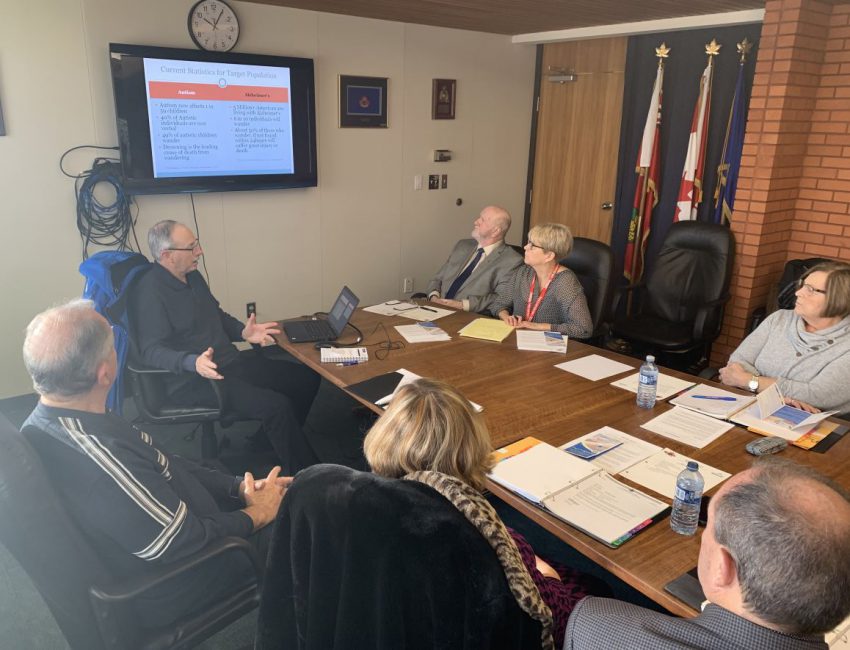Families with loved ones who are autistic or have Alzheimer’s live with a constant worry that one day they’re loved ones could wander off and then time is the enemy to find them safe.
It’s no different in Nipissing District.
However, the non-profit search and rescue agency in North Bay known as BAYSAR is now pursuing a program to help find people in this group much faster in the event they become lost.
The program is Project Lifesaver which sees clients wear a transmitter on their wrist or ankle set to a specific frequency.
Each transmitter broadcasts at a different radio frequency and if that person becomes lost then search and rescue are told the specific frequency of the lost person’s transmitter and armed with tracking devices, they can locate the person in short order.
Stan French, the President of BAYSAR presented the concept to the North Bay Police Services Board and is asking the board to partner with it.
French says One Kids Place in North Bay has 266 clients who are autistic and of that 45 need substantial support.
North Bay also has 12 patients with Alzheimer’s and a further six live in Sturgeon Falls.
French says drowning is a leading cause of death for autistic people while exposure is the prime hazard for Alzheimer’s patients.
French says it’s critical to find a lost Alzheimer’s patient quickly before the person freezes to death.
Also at the police board meeting was Jesse Reid, the Services Facilitator with the Autism Services Program at One Kids Place.
Reid told the board that the majority of the 45 clients are non-verbal eight to 12-year olds.
She says in the last month two clients wandered away but both were safely found.
Following the meeting, Reid said having Project Lifesaver “would be incredibly beneficial for our clientele.”
Both Reid and French pointed out Nipissing District has many lakes and forests which can make it very difficult to find a person.
But French says that’s not the case with Project Lifesaver.
He says “Project Lifesaver advertises a 100 percent success rate.”
“I think it was 3,500 cases where individuals in North America who wore Project Lifesaver transmitters were found (safely) in an average of 30 minutes,” he said.
French says BAYSAR would be the lead agency if Project Lifesaver forms in North Bay and the local police would serve as the associate agency.
He says the rationale for this is it allows BAYSAR to carry out the fundraising in order to buy the Project Lifesaver equipment.
French says the share for the North Bay police is a one-time cost of $1,000 U.S. and BAYSAR would be responsible for raising about $22,000 Canadian.
French says this allows the group to buy three tracking devices, 24 transmitters to be worn by the clients and various supplies.
French says the 24 transmitters are simply a starting point and the goal would be to buy more transmitters in the future.
There are two types of transmitters.
One has a tracking distance of three kilometres while the second transmitter has a five-kilometre tracking range.
French says the goal is to acquire the 5K range transmitters.
There are also two types of tracking devices.
One is an antenna type that is mounted to a police cruiser and can be used to locate the approximate area of the transmitter’s radiofrequency.
Once that’s done, search and rescue or the police can use a hand-held tracking device that pinpoints the lost person’s precise location.
Project Lifesaver is currently being used in Sault Ste. Marie and Sudbury.
French says BAYSAR is pursuing the initiative as a result of the local Alzheimer’s society.
The society learned of a successful search for an Alzheimer’s patient last fall where Project Lifesaver helped find the person and when a forum about the program took place in Sudbury earlier this year, the group got French to attend.
French says Project Lifesaver is also being used in many Southern Ontario communities and adds “it’s been proven to work and it’s time to bring it to North Bay.”
Dennis O’Connor, the chair of the North Bay Police Services Board, said the program looks very worthwhile and said the board will discuss partnering with BAYSAR at its January meeting.


